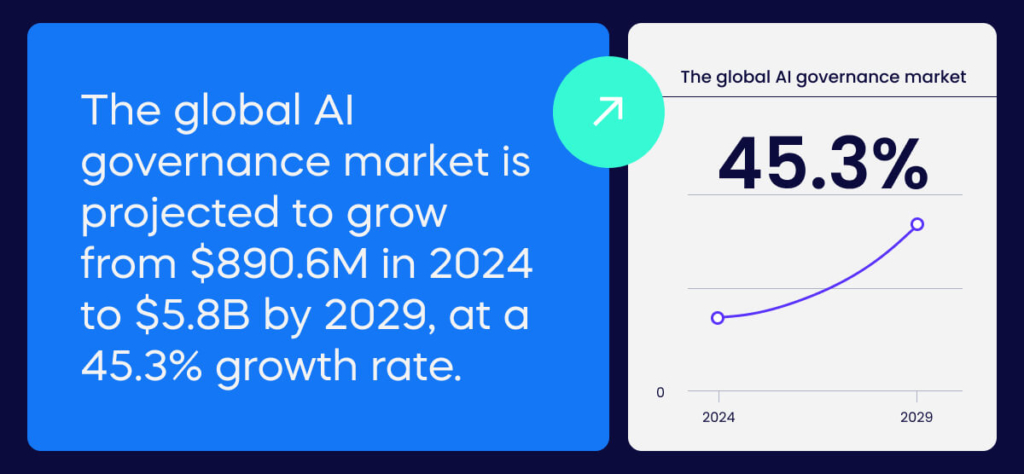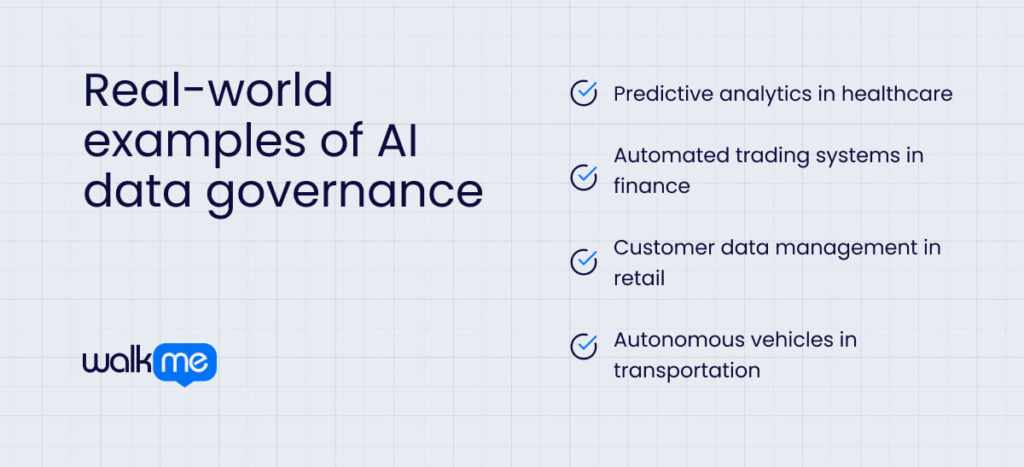The need for strong AI data governance is very important as AI becomes more common.
The global AI governance market is projected to grow from $890.6M in 2024 to $5.8B by 2029, at a 45.3% growth rate. This rapid growth shows the importance of managing data, following laws, and having AI ethics.

AI data governance helps build digital trust by ensuring data is used responsibly and addressing AI privacy concerns. This framework is key for creating fair, legal, and responsible AI as the digital world expands.
This article will explore AI data governance, its importance, implementation techniques, best practices, and examples to help you understand how it supports responsible AI development and usage.
What is AI data governance?
AI data governance is the framework through which organizations manage the data used in AI systems. It encompasses the creation of rules and standards for collecting, storing, using, and sharing data.
Good AI data governance helps prevent problems like privacy issues, security risks, and unfair biases. It ensures that AI follows laws and meets business goals. This approach encourages transparency and accountability, meaning that organizations are responsible for how they use data.
Strong AI data governance is important for AI’s growth, as it builds trust and protects organizations in a world where data is becoming increasingly important.
Why is AI data governance important?
AI data governance is crucial for companies using AI.
It guarantees that data is used carefully and safely. Strong data governance helps companies comply with privacy laws, protect customer information, and avoid hefty fines.
For example, AI is often used in finance for credit checks. However, without data governance, AI could have unfair biases, possibly discriminating based on race, gender, or income. With robust data governance, finance teams can monitor the data and how the AI makes decisions. This reduces the risk of biased choices.
Data governance ensures that laws are followed, such as GDPR, protecting customer information and being clear about how AI makes decisions. This builds trust with customers and helps businesses avoid getting in trouble.
Data governance is key to using ethical and legal AI. It aligns AI with a company’s business goals so that it can use AI responsibly and safely, protecting both customers and the company’s reputation.
How to implement AI data governance
Managing AI data properly is vital for modern businesses. It helps ensure that the data is used carefully and in accordance with the law. Doing this doesn’t just protect private information and follow the rules—it also helps build customer advocacy.
Let’s take a look at how to implement AI data governance:
Establish clear policies
The first step is to create clear policies about how data will be used in AI projects. These rules focus on keeping information private and secure and using it ethically. The regulations state how data can be collected, stored, and used, guaranteeing it follows important laws. The company’s legal and compliance teams work together to confirm guidelines fit with business goals.
Keep data high-quality and safe
Data frameworks must ensure data quality, security, and governance requirements. Accurate, clean data is crucial for AI to work well and be fair. Steps should be taken to analyze the data and fix any problems. Strong security is also important, allowing only certain people to access sensitive personal or financial information and encrypting it.
Check AI follows rules
Regular checks and a team to oversee operations are needed to ensure the AI follows the rules. If required, this team can update the regulations and ensure the AI is ethical and clear about how it works. This builds trust across the organization and with customers.
AI data governance best practices
Now that you understand how to implement AI data governance, it’s time to examine best practices. Companies that use best practices for managing their AI data build trust.
Customers see that the company is careful with their information and using technology responsibly. This trust is crucial for growing the business sustainably and responsibly with AI.
Let’s explore some AI data governance best practices:
Keep data high-quality
Effective data quality management is crucial for good AI governance. Organizations should check, clean, and monitor data for accuracy and reliability. High-quality data helps AI work better and avoids risks from incorrect or biased results. Regular reviews and updates keep data transformation trustworthy over time.
Follow the law
Following legal rules is essential for AI data governance. Businesses must learn laws like GDPR or HIPAA to protect sensitive data and remain lawful. Regular compliance checks and employee training help organizations follow the law, reducing the risk of costly penalties and damage to their reputation.
Be open and keep records
Being open about AI systems means documenting the data, algorithms, and decision-making. Good records allow people to understand how the data is used and how AI choices are made. Thorough documentation builds trust with users and regulators, making reviewing AI systems easier.
Responsibility and oversight
Responsible AI data governance needs accountability and oversight. Organizations should have data governance leaders or committees to monitor ethical and legal practices. Regular evaluations of AI systems and data processes ensure accountability and a responsible data use culture.
Real-world examples of AI data governance

Understanding real-world examples of AI data governance is important to understanding how it works in practice. These examples show how organizations use rules to handle data, follow laws, and build trust.
Businesses can learn useful lessons to improve their own AI projects. Seeing how others do it helps everyone understand the benefits of good data management.
Let’s take a look at some real-world examples of AI data governance:
Predictive analytics in healthcare
Hospitals use AI to predict patient outcomes. They do this by analyzing electronic health records. This helps them identify patients at high risk of readmission. Hospitals follow strict rules for data quality and ethics to ensure trustworthy predictions.
They keep clear records that show how the AI makes decisions, which helps doctors understand the process. This transparency builds trust with patients and meets legal requirements. These guidelines mean healthcare providers can use data effectively to improve digital transformation while following ethical and regulatory standards. Good data governance is key to successful AI in healthcare.
Automated trading systems in finance
Automated trading systems are changing finance. They use advanced algorithms to buy and sell stocks quickly. These systems look at market data to find patterns and make decisions in milliseconds. This limits emotional bias, making trading smoother.
These systems allow companies to perform better, save money, and manage risks well. However, there are challenges, like sudden market changes and the need for careful monitoring. Using advanced technology and machine learning (ML) is important as financial transformation occurs. This helps companies adjust to new situations while following the rules.
Customer data management in retail
Managing customer data is important for stores to succeed. Collecting customer information enables stores to learn what people like and how they shop. This helps create personalized experiences, targeted ads, and better inventory management.
Good data practices also ensure that information is correct and follows privacy laws. Customer relationship management (CRM) systems help businesses connect with customers and build loyalty. In a competitive market, using a customer data platform gives stores an edge and helps them grow in a fast-changing environment.
Autonomous vehicles in transportation
Autonomous vehicles, or self-driving cars, are changing how we travel by making it safer and easier. These cars use special sensors and artificial intelligence to drive, avoid obstacles, and talk to other vehicles. This technology can reduce traffic jams, lower accident rates, and help people who can’t drive.
However, challenges remain, like new laws, updating roads, and getting people to accept these vehicles. Car makers, government officials, and city planners must work together as this technology improves. This teamwork will help make sure self-driving cars fit into our transportation systems.
How can AI data governance support ethical AI practices?
AI data governance encourages ethical AI practices. It sets up rules to ensure data is managed responsibly and protects people’s rights.
Good governance means having a data strategy for collecting, storing, and using data. These guidelines should be clear, helping everyone understand how data is used and what it means. Organizations can reduce biases from bad data by focusing on ethics. This makes AI results fairer.
AI data governance also helps organizations stay responsible by tracking data usage. This helps find and fix any ethical problems, like misusing information or creating unfair algorithms. Regular checks and audits are part of good governance, meaning AI systems always follow the rules.
When organizations show they care about ethical practices, they gain confidence from customers and the public. This trust is important when people worry about privacy and bias.
Ultimately, AI data governance helps organizations use AI responsibly while following ethical rules. These practices allow businesses to meet legal requirements and help create a fairer society.
What is the impact of regulatory compliance on AI data governance?
Regulatory compliance affects AI data governance by guiding how companies handle, use, and protect data.
As governments create rules about data privacy and security, organizations must change their practices. For example, laws like the California Consumer Privacy Act (CCPA) in the U.S. require strict data handling. This includes getting permission to collect data, ensuring it is correct, and being clear about how it will be used.
Following these rules helps organizations act responsibly. Companies need good data management systems with proper records and reviews. This ensures data is used fairly and lowers the risk of leaks or misuse.
Not following these rules can result in fines, damage to reputations, and loss of customer trust. Compliance also encourages companies to invest in better technology and training. This helps promote responsible data handling and builds confidence in AI systems.
AI data governance vs. traditional data governance
AI data governance differs from traditional data governance because it focuses more on data quality, ethical use, and how algorithms are held accountable.
Traditional governance involves managing data and following rules. In contrast, AI governance addresses the special challenges of ML and AI systems. It makes sure the data used for AI is accurate, fair, and not biased.
AI governance creates rules to ensure that AI systems are used fairly and responsibly. It focuses on important issues like justice and discrimination. This means organizations need to be clear about how they use AI.
Building trust through AI data governance
Strong AI data governance is important for companies that want to use AI safely and fairly.
Focusing on data quality, fair use, and AI security means businesses can make rules that follow laws and build customer trust. Companies should have clear rules to ensure data is handled properly and check to see if the data is correct.
It’s also important to explain how AI makes decisions so everyone can understand. Regular checks help find problems and encourage responsible AI use. Teaching workers about these rules helps everyone work responsibly.
As AI technology changes, these strategies will help companies use AI while keeping customer data safe. AI data governance ultimately helps companies avoid legal trouble and promotes fair and responsible use of AI.
FAQs
AI can help make decisions faster, understand a lot of information, and clarify things for everyone. It can also find problems, help use resources better, and ensure rules are followed. This allows governments and organizations to work better in health care and community services.
Better data governance means taking care of data to ensure it is correct and useful. This is important for AI to work properly. It helps confirm that AI is fair and easy to understand. By having clear rules, organizations’ AI systems are responsible and give good results.

